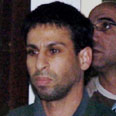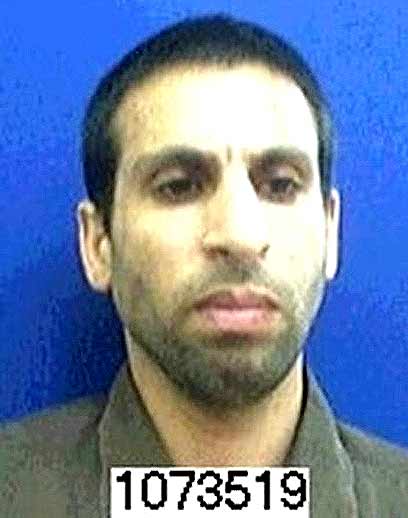
Sela's silent victim
Twenty years after being attacked, serial rapist's first victim finally speaks out about her ordeal
“When I saw him for the first time on television, with the big jacket covering his entire head, I burst out crying,” says Yael (not her real name). “Even though I couldn’t see his face, I said to my husband: ‘That’s him. That’s Benny Selach. That’s the man who raped me.’”
“It was a terrible period,” she reports. “I couldn’t fall asleep at night; I couldn’t calm down during the day. I was running on automatic. It was even more horrible than the months after the rape itself. When I suddenly realized that he was the serial rapist, I didn’t know what was happening to me. I was a broken person, miserable.”
Yael was a 14 year old boarder on Kibbutz Shaar HaGolan when Benny Sela, then known as Benny Selach, locked her in a bomb shelter behind the swimming pool. Over the next two days, he beat her, tore her clothes, stabbed her with a pocketknife, and raped her repeatedly.
Authorities believe that Yael was Sela’s first victim. Two weeks after the rape, she left the kibbutz and returned home to Hadera. Now, 20 years later, she offers Yedioth Ahronoth her first interview.
Rape in a bomb shelter
Yael, tall and pretty with blue eyes and blonde hair, was born and raised in Hadera. When she finished elementary school, she begged her parents to let her go live on a kibbutz. Although her mother vehemently opposed the move, her father let Yael have her way.
Thus, in 1985, Yael found herself in Shaar HaGolan. She was assigned to a group of boarders, including Benny Selach, then 15.
Coincidentally, H. and P., Yael’s adoptive parents, had been Selach’s adoptive parents two years earlier. “Due to reasons that had nothing to do with him,” H. insists, “he switched to another adoptive family.”
Yael and Selach were part of the same crowd. “We would go around a lot, sometimes even just the two of us,” she recalls. “I wasn’t afraid of him. He was small and skinny. I was tall and strong, and when he would attack me, I would give it back to him.”
Five months after her arrival at the kibbutz, Selach dragged her to the bomb shelter. It was a Friday, and the group of boarders was scheduled to leave on a two day hike. Yael was standing with her knapsack, when Selach jumped on her and pushed her to the ground.

Benny Sela (Photo: Tel Aviv Police)
“He told me that he wants to show me something and that I should come with him,” she recounts. “There was no indication of what was going to happen, just another one of his pranks.”
They passed the kibbutz pool and reached the shelter. Selach opened the heavy iron door, shut it closed behind them, and pushed Yael down the stairs.
“’Go down; go down already,’ he shouted at me,” Yael continues. “I yelled back at him, and then he yelled: ‘Shut your mouth.’ And he started kicking me. I was shocked. He screamed: ‘Take your clothes off.’ And I suddenly realized that it was serious.
“He took a small pocketknife out of his pocket and stabbed me with it in my hand. ‘If you don’t shut up,’ he yelled, ‘I’ll kill you.’
“He threw me to the ground, kicked me in the stomach, and tore my blouse. He was small and skinny, and I always thought that I was stronger than him. But when he went crazy, I couldn’t do anything.
“He raped me and hit me, and I think that at this stage, I lost consciousness. What I do remember from there, afterwards, are only fragments of images. I remember him leaving and coming back, myself opening my eyes and seeing him on top of me, his face on my face, his open mouth, and his teeth. He raped me again and again.
“On Shabbat, approaching evening, when he wasn’t in the shelter, I dragged myself up the steps. I discovered that he hadn’t locked the door, and I went out of there.
“Near the dining room, he caught me. ‘If you open your mouth,’ he said to me, ‘I’ll kill you.’”
Silence in the kibbutz
When Yael reached her adoptive parents’ home, only P., the father, was home. He insisted that Yael wait and speak to his wife H.
“When she returned, I told her. I was bruised and frightened.” Yael states. “She said to me. ‘What are these stories? Come on, really. What nonsense.’”
H. refused to believe Yael’s accusations, and Sela continued to threaten to kill her. No one else asked any questions, and two weeks later, Yael quietly left the kibbutz.
The bad years
Back in Hadera, Yael told her father but not her mother about the rape. Meanwhile, she graduated high school and enlisted in the army. At some point, she underwent some psychological counseling.
Around 15 years ago, after completing her army service, Yael met a young paratrooper officer from Jerusalem.
“Already during the first date, she told me the story,” he recalls. “’You should know,’ she said to me, ‘that I was raped, that I’m not exactly normal.’”
But he was not discouraged. The couple eventually got married, moved back to Hadera, and had three children.
“He needed to be very patient with me,” Yael admits. “There were instances when in certain situations, everything would come back to me, when I would suddenly go out of my mind.”
Even today, Yael’s adoptive parents claim that she never told them anything. In fact, according to H., the adoptive mother, they only remember Yael herself “more or less.”
Yael confesses that it has taken her years to learn not to feel shame over the incident and to understand that it was not her fault.
“Those that are close to me know the story,” Yael says. “I don’t go into all the details, but I told people what happened to me, so they can understand me better.
“I’m angry that I was silent, that I gave up. How could I not settle accounts with him? How did I agree to have them say in the kibbutz that there wasn’t a rape, (rather than) stopping this madness at that point?
“It took me months to recover from it, to get back to myself, and now it’s coming again. Out of the blue, my sister calls me and says to me: ‘I heard on the radio that Benny Sela escaped.’
“I’m not scared of him; I’m scared of the silence.”










